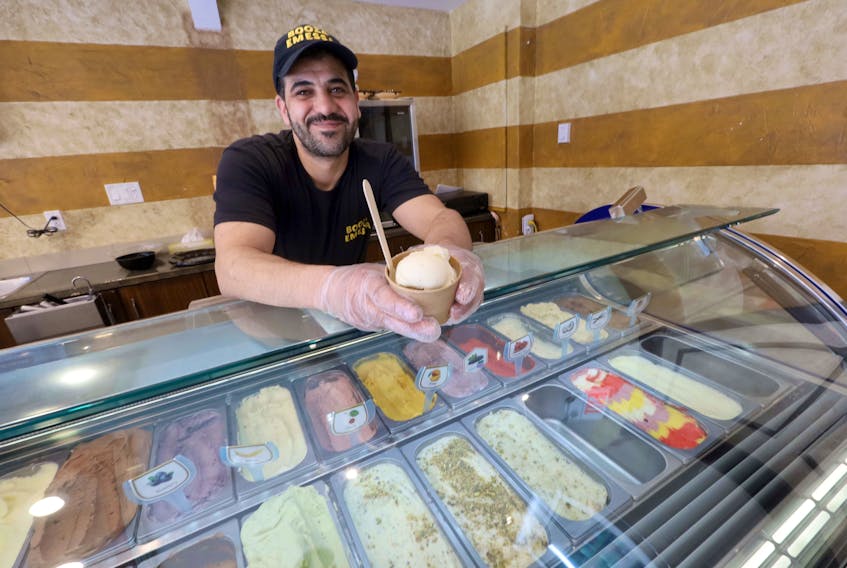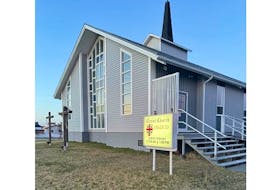Much like many other businesses in Nova Scotia, Samer Aljokhadar’s business has taken a hit from COVID-19.
His Bedford ice cream store that he opened in July 2019, Booza Emessa Ice Cream, has “slowed down very much” since the start of the pandemic, said Aljokhadar, who is a Syrian refugee that arrived in the province in 2016.
In the winter, which is considered to be slow season for ice cream shops, the business was getting between 10 to 20 customers each day, according to Aljokhadar.
Since the emergence of COVID-19, only one or two customers have been ordering takeout or delivery ice cream from the shop – which temporarily closed for two months – a day.
“In the wintertime it was slow and we were looking forward to the springtime, like from March and April to be better,” he said.
“But COVID-19, it’s damaged it all.”
Because his business is fairly new, it did not meet the eligibility requirements for the Canada Emergency Business Account, so Aljokhadar has been living off of the Canada Emergency Response Benefit since March, providing him with $2,000 a month. But it’s not enough, he said, as it costs him $2,600 a month alone to pay the rent for his store.
“In the wintertime it was slow and we were looking forward to the springtime, like from March and April to be better. But COVID-19, it’s damaged it all.”
- Samer Aljokhadar, owner of Booza Emessa Ice Cream
“It’s a very, very bad situation,” said Aljokhadar, who supports his wife and three children in Nova Scotia, along with his mother in Jordan.
Aljokhadar reopened the shop two days ago, with hopes that parks, trails and community gardens reopening in the province would inspire more people to go outdoors and maybe, just maybe, get a craving for ice cream.
He said he hopes life will return to normal for all soon and that people continue to support local business.
“It’s very important to support small and new businesses. ... We have to help each other as much as we can just to stand up.”
'A disappointing time'
Alaa Eddin Alakkam, who owns 902 Restaurant & Catering in Halifax, has had similar challenges running his business in the past two months.
Alakkam, a Syrian refugee who arrived in Nova Scotia in 2015, opened the restaurant in December 2018.
From mid-March to early April, he said sales dropped between 70 to 80 per cent at the restaurant, forcing him to make the tough decision to close down the restaurant temporarily and lay off five employees.
It's been a disappointing time, he said, since his business had built a steady customer base and was doing "really well" before the pandemic took hold.
And although his restaurant qualified for and received $40,000 through the Canada Emergency Business Account, Alakkam noted, "It's still loans and we have to pay it back."
On Wednesday, Alakkam reopened 902 Restaurant & Catering for takeout and delivery service due to "financial issues," adding, "we need money to pay our bills, our rent."
Still, Alakkam said he remains worried that his business “might not continue” on for much longer.
"We don't know what's going to happen. Who knows if this is going to last another two months or so?"
COVID-19 has also taken a toll on Khaled Al-Hilal’s business, Al-Hilal Meat Shop, which he opened in Halifax in 2017, a year after arriving in the city.
The store now gets about 15 customers a day, compared to more than 100 a day before the pandemic, according to Al-Hilal’s friend Ala Hadad.
Revenue has also dropped since many members of the Muslim community in Halifax – who make up a large portion of the business’ customer base – are fasting during Ramadan, Hadad added.
“The business is very down,” said Hadad, speaking for Al-Hilal.
The financial struggles have put a strain on Al-Hilal, who has had to keep up bills at the store while supporting his eight children and wife.
“He’s upset. He lost money. He has a big family. Too many bills to pay, he doesn’t have money, this gentleman,” said Hadad.
“The future will be good (for small businesses), I hope it will be better."









